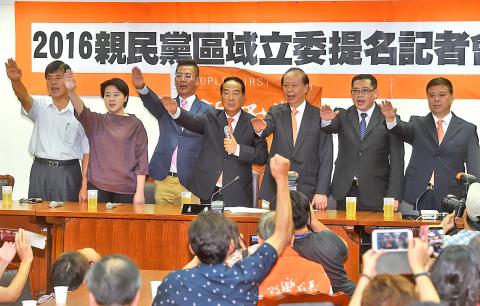People First Party (PFP) Chairman James Soong (宋楚瑜) yesterday said he would consider running for president if he thinks the two major parties’ policies have been “hijacked by fundamentalists.”
The PFP held a press conference in Taipei to announce its five legislative candidates for the Jan. 16 elections. Three of the candidates are former Chinese Nationalist Party (KMT) legislators, including Chang Sho-wen (張碩文), who just withdrew from the KMT earlier this week.
Soong likened the KMT to an apothecary that “sells counterfeit medicine.”

Photo: Chien Jung-fong, Taipei Times
“It is not that the PFP has turned ‘green,’” Soong said, addressing criticism that the party has aligned itself with the Democratic Progressive Party (DPP). “It is that we can no longer say for sure whether the KMT is lan [藍, blue] or just lan [爛, rotten].”
The PFP has always been Sun Yat-sen’s (孫逸仙) disciple and a resolute follower of former president Chiang Ching-kuo’s (蔣經國) path in safeguarding the Constitution of the Republic of China and Taiwanese democracy, as well as pushing for cross-strait reconciliation, Soong said.
“The PFP is willing to stand by good KMT candidates, but if the KMT cannot break away from [President Ma Ying-jeou’s (馬英九) inner circle], we have no other choice but to field our own,” the chairman said.
When asked whether he would run for president, Soong said he would consider the possibility if the public calls for it, but added that it was not yet time to make a decision and he would continue to keep an eye on the KMT’s and the DPP’s policies.
Separately yesterday, KMT Legislator Cheng Ru-fen (鄭汝芬) of Changhua County said she would turn down the party’s legislative nomination. She is the seventh KMT lawmaker who has decided not to run for another term.
Cheng’s announcement came hours after KMT Legislator Chang Chia-chun (張嘉郡) voiced her misgivings about KMT presumptive presidential nominee Hung Hsiu-chu’s (洪秀柱) cross-strait proposal of “one China, common interpretation” and threatened to withdraw from the party.
“Public opinion has changed after the nine-in-one elections in November last year. The KMT would be going against the tide of public opinion if it does not undertake reforms,” Cheng said.
Hung, when asked about the show of disapproval from several KMT lawmakers, said she would work on improving communication with lawmakers.
Hung’s spokesperson, Jack Yu (游梓翔), said that the deputy legislative speaker’s team has been communicating with party comrades about her cross-strait policy.
He said that after talking to some party members, they “have grasped the content of the policy and believe that Hung’s cross-strait policy reflects Taiwanese mainstream opinion.”
The policy is a demand that “Beijing respect the existence of the Republic of China as a fact, based on the ‘1992 consensus,’” Yu said.

Several Chinese Nationalist Party (KMT) officials including Chairman Eric Chu (朱立倫) are to be summoned for questioning and then transferred to prosecutors for holding an illegal assembly in Taipei last night, the Taipei Police said today. Chu and two others hosted an illegal assembly and are to be requested to explain their actions, the Taipei City Police Department's Zhongzheng (中正) First Precinct said, referring to a protest held after Huang Lu Chin-ju (黃呂錦茹), KMT Taipei's chapter director, and several other KMT staffers were questioned for alleged signature forgery in recall petitions against Democratic Progressive Party (DPP) legislators. Taipei prosecutors had filed

Taiwan would welcome the return of Honduras as a diplomatic ally if its next president decides to make such a move, Minister of Foreign Affairs Lin Chia-lung (林佳龍) said yesterday. “Of course, we would welcome Honduras if they want to restore diplomatic ties with Taiwan after their elections,” Lin said at a meeting of the legislature’s Foreign Affairs and National Defense Committee, when asked to comment on statements made by two of the three Honduran presidential candidates during the presidential campaign in the Central American country. Taiwan is paying close attention to the region as a whole in the wake of a

President William Lai (賴清德) has appointed former vice president Chen Chien-jen (陳建仁) to attend the late Pope Francis’ funeral at the Vatican City on Saturday on his behalf, the Ministry of Foreign Affairs said today. The Holy See announced Francis’ funeral would take place on Saturday at 10am in St Peter’s Square. The ministry expressed condolences over Francis’ passing and said that Chen would represent Taiwan at the funeral and offer condolences in person. Taiwan and the Vatican have a long-standing and close diplomatic relationship, the ministry said. Both sides agreed to have Chen represent Taiwan at the funeral, given his Catholic identity and

Lawmakers from the Democratic Progressive Party (DPP) yesterday established a friendship group with their counterparts in Ukraine to promote parliamentary exchanges between the two countries. A ceremony in Taipei for the Taiwan-Ukraine Parliamentary Friendship Association, initiated by DPP Legislator Chen Kuan-ting (陳冠廷), was attended by lawmakers and officials, including Deputy Minister of Foreign Affairs Francois Wu (吳志中) and European Economic and Trade Office in Taiwan Director Lutz Gullner. The increasingly dire situation in Ukraine is a global concern, and Taiwan cannot turn its back when the latter is in need of help, as the two countries share many common values and interests,